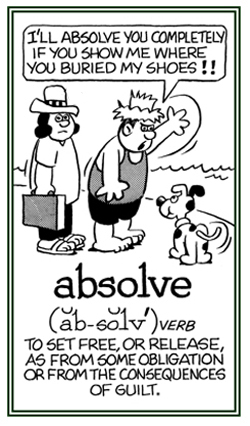a-, ab-, abs-
(Latin: prefix; from, away, away from)
This prefix is normally used with elements of Latin and French origins (abs- usually joins elements beginning with c, q, or t).
The form ab- is regularly used before all vowels and h; and it becomes a- before the consonants m, p, and v. The prefix apo- has similar meanings.
This list is a very small sample of the multitudes of a-, ab-, abs- prefixes that are available in dictionaries and those in this unit are only meant to present a few examples.
2. People who are not attending their employment, school, duty, etc.: The number of absentees at the factory was of concern to the managers.
The student leadership was upset about the number of absentees at the rally the day before.
The rates of absenteeism in the work force caused the factory to reduce production.
The explanations for a number of absenteeisms varied from headaches to injuries.
As a joke, the student club at the university decided to give an award to the most outstanding absenter, the one who missed most of his or her classes!
At the awards ceremony, there was a tie with two absenters because they were not present for the same number of times.
2. Descriptive of an individual who is lost in thought or shows a preoccupation with something else: The absentminded writer couldn't remember where he put his notes for the new chapter of his book.
Jesse, the scientist, appeared to be puttering around in his garden absentmindedly, but he was really distracted because he was thinking about a new scientific formula.
Jeff's absentmindedness caused him to be late because he took the wrong public transportation to work.
2. A preoccupation with something that is so great that the ordinary demands of attention on something else are ignored: Cheryl was so lost in her absentmindedness that she was unaware of where she was or what she was supposed to be doing there.2. Not limited by restrictions or exceptions; unconditional, total trust: Earl told Diane that she had his absolute confidence.
3. Unqualified in extent or degree; total: Marie could hear a pin drop in the absolute silence of the room.
4. Unconstrained by constitutional, a counterbalancing group, or other provisions, etc. in the exercise of governmental power, especially when arbitrary or despotic: James was an absolute ruler in his position as the absolute monarch.
5. Regarding something which is not to be doubted or questioned; positive, certain: The police have absolute proof of Philip's guilt.
6. Relating to units of measurement derived from fundamental units of length, mass, and time: The laboratory was supplied with the necessary equipment to determine the absolute temperature of the liquids.
7. Pertaining to the scale of a grading system based on an individual's performance considered as representing his or her knowledge of a given subject regardless of the performance of others in a group: Jessica's absolute performance during the year qualifies her for the special graduation honors.
8. Etymology: from Latin absolutus and absolvere, "to set free, to make separate".
Logically, absolute terms cannot be compared, as with "more" and "most", or used with an "intensive modifier", such as "very" or "so" because something either is complete or it is not. It cannot be "more complete" than something else, consequently sentences, such as "Mike wanted to make his record collection more complete", and "Joyce can improve the sketch by making the lines more perpendicular", are often criticized as being illogical.

Go to this Word A Day Revisited Index
for a list of additional Mickey Bach illustrations.
Craig was afflicted with absolute glaucoma during the final years of his life.
Susan asked, "Eugene, are you absolutely sure that we are on the right road and that we are not absolutely lost?"
Victor and Martin are absolutely opposed to the idea of making any additional changes.
2. Release from a duty or promise; a discharge: The soldier obtained absolution from the charges made by a fellow soldier.
Because new evidence had been discovered, Rick, the defendant, was absolved of the criminal charge.
2. To forgive someone, especially for a religious or moral fault: Mary asked the priest to please absolve her of her sins.3. To relieve a person of some kind of requirement or obligation: The court absolved Ernest of the responsibility of any further repayments of the loan.
At the board meeting that day, they agreed that they would be absolving the company of any charges of misdeeds.
Bert was absolved of having to pay his partner's debts.
4. Etymology: from Latin ab-, "from" + solvere, "to loosen".
Go to this Word A Day Revisited Index
for a list of additional Mickey Bach illustrations.
The company absorbed the two smaller companies creating one large conglomerate.
2. To engross, or to completely engage the attention or faculties: The students were completely absorbed by the magic of the teacher's story telling.3. To take up or to receive imponderable agents by chemical or molecular action: Not long after Howard swallows his vitamins, they will be absorbed into his blood stream.
4. To assume the burden of costs, expenses, etc.: The owners, Mr. and Mrs. Robinson, will personally absorb the small financial loss in order to continue to keep their company solvent.
5. To take in a shock, jolt, etc. with little or no recoil or reaction: The soft surface seemed to absorb the impact of the hammer.
6. To soak up and not to reflect: Carlos, the builder, told them that the light rays were absorbed by black surfaces and he also said that cork ceilings absorbed sound.
7. Etymology: from Latin absorbere, "to swallow up"; from ab-, "from" + sorbere, "to suck in".
2. The full involvement in doing something that a person wants to achieve: Shirley's absorbabilities while studying at the university resulted in a doctor's degree that was attained in less time than was normally required.


